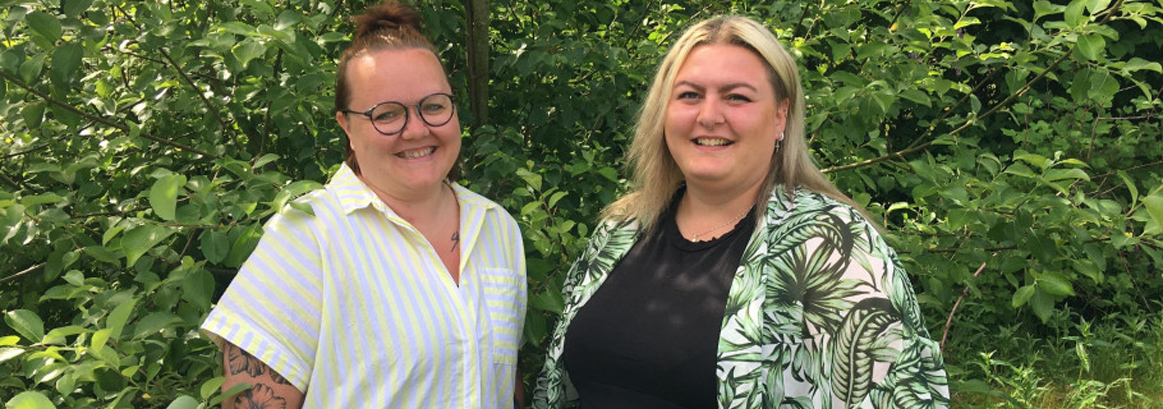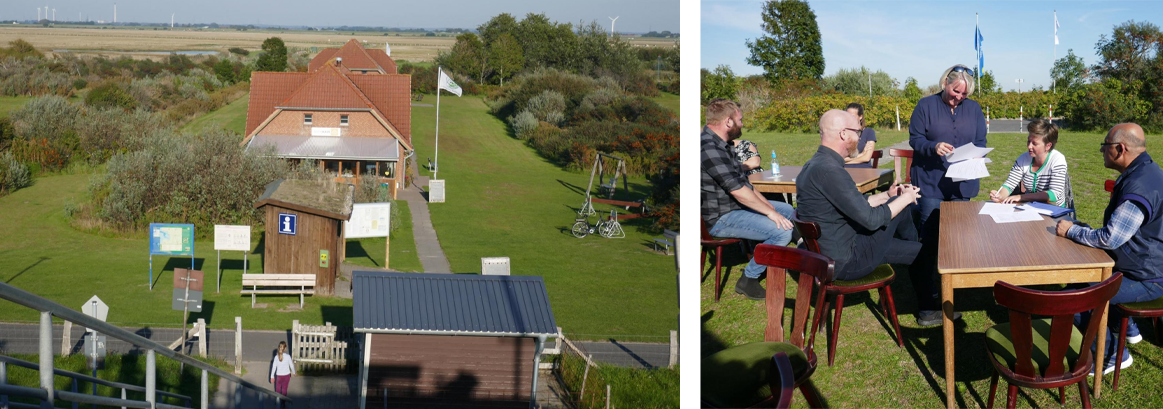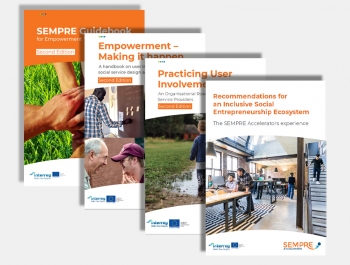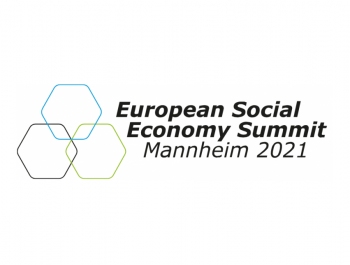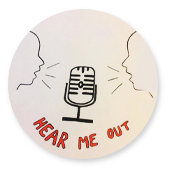
|
Location: Esbjerg, Denmark Vulnerable group in focus: People with mental health difficulties Coordination: University College South Denmark, Rune Karlsson Do you speak Danish? Visit the local blog of Hear Me Out |
|
Social Start-Up Biography On this page we want to document Hear Me Out and its development into an independent social start-up. To take you with us on this journey, we update this interview diary every other month. If you have further questions, feel free to contact the local coordinator (see above). If you want to learn more about certain terms you may encounter here (such as "micro project", "social start-up", "Accelerator Team" and the like), please check our "the ideas behind the project" section. |
| Choose your issue of the Hear Me Out biography: DEC 2019 FEB 2020 APR 2020 JUN 2020 OCT 2020 DEC 2020 FEB 2021 APR 2021 |
|
Tell us about your Micro Project in three sentences! "Hear Me Out" is an initiative for young and grown up people with mental health difficulties. The purpose of the project is to develop methods and activities so people with mental health difficulties can get a voice in society and express themselves in order to fight prejudice and inform others about their difficulties and their challenges. Who are the persons behind the initiative? Like the other social start-ups in this project, a so-called Accelerator Team is at the core of our activities. We call this team editing group, it integrates users, leaders of the hosting institution (Social Psychiatry in the Municipality of Vejen), students, social workers, and lecturers from UC Syd. What are your long-term goals? First and foremost, our long-term goal is to enable the project to become sustainable and to develop stable ways and methods of organising the project. The beginning of our initiative can be traced back to the year 2017, originating from a Research project involving lectures and students of UC Syd. However, after a while the project somehow petered out as the right structural foundation for a long-term project was missing. Now we are reactivating the project and our goal is to grow the "wings to fly" that are needed in order to have a project that stands on its own feet once the support of SEMPRE Accelerators ends. More precisely, this means that (1) we want to develop a strategy how to make the "voices" actually heard in the "outside world", (2) we aim at improving our skills for making videos, podcasts and other relevant instruments to reach the public and (3) we want to create an organisation that takes the special needs of the users into account; this new organisation should be supported by the right "scaffolding structures".
Which topics do you currently address in your micro project? Our initiative works with a range of activities we teach students at UC Syd. The name of the project changed to “Hear me out” when it joined the SEMPRE ACE project. The project members record the lessons. We want to use YouTube together with the podcast as ways of getting heard. For us, telling our story through YouTube is a great method to raise awareness for our topics among a broader public. Moreover, some of the participating students interview project members who are willing to tell their story, among a broader public. Moreover, some of the participating students interview project members who are willing to tell their story, using an adapted form of "Participatory Rapid Appraisal", a method developed in the SEMPRE project. What were your recent challenges? Compared to the other social start-ups in SEMPRE Accelerators, we started rather late. It took a bit longer to identify the "right" micro project out of the many potential candidates. Now we – SEMPRE Accelerators together with "Do you want to hear what we say?" are happy to embark on a journey towards becoming a stable and mature social start-up. What are your short-term goals for the next months? In the short run, our goal is to catch up with the delays we experienced and to develop a strategic approach how we can reach our goals in terms of sustainability and maturity until early 2021 – which is when the support of SEMPRE Accelerators will end.
Right now, public life in Europe has come to a standstill due to COVID-19. But let’s start with the time before. What were your recent achievements before the pandemic started to spread? We organised several “kitchen talks” in January and we were planning to repeat them in June, but cancelled because of the Corona situation These are basically interviews with people with disabilities participating in our editing group. The interview footage will later be edited. Some of the interviewed persons want their story told widely – Some want to use the story more privately and get their voice heard in another way in their private lives. Moreover, we started planning several other activities, such as a job shadowing and a visit at the SEMPRE Accelerators social start-up in Rucava (Latvia) which has certain similarities with our undertaking and with whom we thus wanted to exchange and learn from each other. However, all these activities were suddenly put on hold when COVID-19 started to spread in Europe. How did the pandemic influence your activities? We started working with video conferences, which works relatively well. Still, it is challenging because we cannot see and feel the interaction between people, which is quite important in our context. We hope we will be able to meet soon again, even if it is just possible with a physical distance. But there is also good news: we started working on a podcast series, and the release of the first issue is planned for later this month.
During our last interview you told us about a podcast you are about to develop. Did you make some progress in the meantime?
Yes indeed! The first five issues of the podcast were successfully recorded, edited, and published. If you speak Danish, you may find them on our local website here. We are very happy about this achievement, especially under these difficult circumstances with the pandemic. In the first podcasts, members of our editing group (which you can see on the picture below) introduce themselves and explain their challenges as being vulnerable and living in isolation from family and friends under the current lockdown. An article and a press release describing the project has been made for the UC Syd Website here.
Last time you told us about a podcast that your group develops. How is it going? We are progressing well. We are particular happy about a new job opportunity that developed for one of our participants. Thanks to her podcast experience, she is currently doing an internship at a radio station in Esbjerg. This is a good opportunity for her to further develop her skills and gain insights into this profession. From a more strategic perspective, what are the major milestones that you still want to reach with Hear Me Out until SEMPRE Accelerators ends? During the first interview you said that your main goal is to stabilize the initiative from an organisational perspective. We work on several measures to advance towards stability and sustainability. For example, we are trying to initiate a cooperation with the local job center. If successful, this would add tremendously to the long-term perspective of our initiative. Right now, we are arranging meetings with the leader of the social psychiatry in Vejen and with the job center to discuss potential forms of cooperation. But this is not all. We are also working on a cooperation with the University College South Denmark, where teachers, students and members of Hear Me Out come together. Finally, we are working on upgrading our website with new material – especially podcasts, YouTube videos and interviews from the members of Hear Me Out. All these measures – be it small ones like the website or big ones like the cooperation with the job center – help us to improve the foundation and long-term perspective of Hear Me Out. This last point – the cooperation with the job center – is essential from a strategic perspective. This is also the reason why we had a targeted meeting with them, a “micro project breakfast” as we call it. What is this breakfast about? In SEMPRE Accelerators, we understand it as a tool that can bridge the gap between social service providers and social service users in an informal way. Here in our region, we met with the job center in Vejen, and this meeting was extraordinarily productive. Not only did we manage to raise awareness for our activities vis-à-vis the job center, a key stakeholder, but moreover we also consulted with them about several options for future collaboration. We are thinking about different ways of advertising our services through the job center, and vice-versa they explained us what to consider from their perspective, to make sure that this collaboration can become as fruitful as possible. Against this background we hope that this breakfast event marks the beginning of a longer collaboration. Below you can find pictures from the meeting.
In late summer you visited the SEMPRE Accelerators social start-ups from Germany in Nordermeldorf at the North Sea Coast. What was the purpose of the visit? The event was a part of the SEMPRE Accelerators visiting scheme. The purpose of this scheme is to create awareness for common challenges that the partners share, no matter whether they are located in Estonia, Sweden, Germany or elsewhere in the Baltic Sea Region. Through these events, the participating Accelerator Teams partners aim at initiating problem solving strategies in complex settings. The meeting was a good opportunity to learn about our fellow start-ups AllDi, which is working with single parents, and Newspaper & Web, which targets migrants. More information about the event is also available here. Did you also present your work at the event? Yes! We talked about our podcasts and their growing audience. Through the podcasts, the participants can process their challenges and at the same time encourage other people who might find themselves in a similar situation. Just a few days ago, Tove and Chloé from the team released a new podcast episode. It is already the sixth episode and in the podcast they talk about the future of the podcast project. If you are curious and speak Danish, you can listen to the full story here.
Many parts of Europe are again in a lockdown due to the pandemic. How is the situation for you at Hear Me Out? The pandemic is indeed a challenge for us. Here at Hear Me Out, an important element is that we bring students and our group members together. Now, with all the restrictions, they were unable to meet in person. This has made it difficult to create a safe space, where the participants could share their story. Why is personal contact so important in your case? Let me tell the story of one student. He said, before engaging with Hear Me Out, he knew in theory what it means to live with borderline. But then, after real exchange with some of our group members, he said that his perspective changed completely. Meeting a “real” person made him gain a more emotional understanding of what it means to live with borderline. Several students confirmed that for them, the cooperation with Hear Me Out has provided a greater understanding of the everyday life of people with mental illnesses – in a way that is different and much more intense compared to reading about the same illnesses in a study book.
Welcome to the final wrap-up of this interview series! SEMPRE Accelerators started one and a half years ago. Back in the first interview, you said that your main goal is to revive Hear Me Out and to stabilise it. Eventually, Hear Me Out should become an independent social start-up that does not rely on support from SEMPRE Accelerators. How would you evaluate your journey? What were your main achievements? We are happy that we were able to welcome several new group members. Since Hear Me Out is basically their project, since they own the project, this is one of the most important prerequisites for the success of Hear Me Out. Together, we recorded podcasts, did so-called “kitchen talks”, and some of the group members even joined as teachers in a job shadowing exercise. Through Hear Me Out, one participants, an experienced podcaster, even connected with a local radio station and they invited her for an internship. Together, we empowered the members of Hear Me Out to make their voices heard. And we will continue doing so. Speaking of the future, how do you see the future of Hear Me Out? Throughout the one and a half years in SEMPRE Accelerators, we not only managed to revive Hear Me Out – basically out of nothing – but we also established cooperation with different local stakeholders – be it the Job Centre, the municipality, or the University College South Denmark. These collaborations are crucial for the future of Hear Me Out, they are what we referred to as “scaffolding structure” here in the very first interview. To give one example, the cooperation with the University College ensures that Hear Me Out can continue to support people with mental disabilities by integrated some of the activities in their courses. For instance, we developed a project for the students at the pedagogical education and occupational therapist education. This project will be integrated into their regular education programme (always in their last semester in the fall / winter). The goal will still be surrounding the participants “making their voice heard”, but we are also including new participants from the cities of Esbjerg, Varde ,Grindsted and Billund. |


